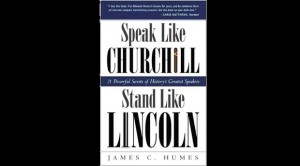The Power Talk

By James C. Humes
Three Rivers Press, 2009
This piece is peppered with well-placed wit and humor. The power of storytelling is almost in every five paragraphs. The use of questions to draw attention or provoke thinking is used generously. Some poetry is sprinkled all over the opus to elevate discourse to a loftier level. Statistics are thrown in with compelling simplicity and visual appeal! The words are pithy and terse.
Am I speaking of a piece of oratory or of an inspirational speech?
No, I am referring to a 208-page book titled “Speak Like Churchill, Stand Like Lincoln.” Only a consummate speechwriter can write a book that reads like a speech! It is a very well-written, easy-to-read—but not simplistic, may I add—book on the “21 powerful secrets of History’s Greatest Speakers.”
And these secrets are divided into 21 brief chapters consistently preceded by the word “power.” This author has proven to be a master of rhetoric—in spoken English, because he has been a speechwriter for four American Presidents; and in written English with his books on history and history-making figures—like this one.
He begins, interestingly enough, with the “Power Pause.” This author dares to be different or is downright funny. I could hardly imagine starting the book with a pause! And then I realize, he advises some of us, when we are already at the podium, to have a “pregnant pause” of silence for one minute before an audience naturally aghast! It is one way to grab attention, he begins. And he sustains our attention all throughout the book.
And then we understand. He quotes William Shakespeare who wrote: “I stand in pause where I shall first begin.” He speaks of Napoleon Bonaparte who began his prebattle speeches before his soldiers with a pause for 40 to 50 seconds.
Author Humes has a lot to say about wordless speeches. The first is the power of pause, second, Power Presence., and third Power Gesture: “Less is more” is a speaking technique that Presidents as well as preachers exploit as they build a foundation of words.”
He illustrates Power Presence with a story on George Washington, first American President, who stands 6’3” and spoke while perched on a white stallion just before battling the English “aggressors.”
This speechwriter practices what he preaches. Chapters and subtitles are alliterative headlines like : “Terse is better than tedious,” “incisive sounds decisive,” short is sharper, brief is better”; and “tell a story, not a speech.”
Power Opener and Power Point should come together when you begin your speech, and author Humes has made sure they are read one after the other.
He advises against this all-too-familiar line: “It is a pleasure to speak ….” In a merciless commentary, Humes calls this opener “banal, boring and blah!”
Power Point is what Dwight Eisenhower called “the bottom line message.” In our time and age, we call it “your elevator story.” You say it as soon as the elevator closes with you inside, and end it when the lift opens. The book quotes Cato, the great Roman orator who underscored the power point: “Find the message first and the words will follow.”
Do you need quotations in your speech? Humes has this to say: “Speech is theater. So dig up one apt quotation and frame it with props.
A story is told that John Kennedy’s speechwriter Ted Sorensen is a quote master, and Kennedy believes in punctuating his speeches with quotes. Of Churchill, Kennedy once remarked: “He mobilized the English language and sent it into battle.”
One question that always pops up speaking of speeches: Who should be the highlight in a public speaking event—the speaker or the visual? Humes says: “Emphasize oral projection, no mechanical projection. No inanimate screen can match a flesh-and-blood presentation.”
Chapters in tandem, Power Wit and Power Parable are as interesting as witty reads. The author’s engaging style, which has never flagged, counsels the readers to draw the distinction “between a joke and humor.” He continues: “It is the difference between a pornographic picture and a love scene in a good movie.”
An author once said elsewhere: “Wit is using something familiar and giving it a twist or a surprise.” One quote that has been popular is “Hitch your wagon to a star.” A modern writer gave this quote a twist that runs: “Hitch your agony to a star!”
This chapter is a must read in this book, because it has a wealth of examples. For our purpose, it is sufficient for the author to say this: Follow the R’s of presenting humor—make it Realistic, make it Relevant, and don’t read it.”
The companion chapter, Power Parable, recommends mastering the art narrative.
“Great is the art of beginning, but greater is the art of ending,” writes Humes, quoting Henry Wadsworth Longfellow. For a strong ending, you have to appeal to the emotions— pride, hope, love and, occasionally, fear. Churchill ended one of his speeches with “Give us the tools to finish the job.”
He addressed this to the United States which joined the war against the Axis powers following the bombing of Hawaii. Or, the ending is the mighty climax of a refrain—like Ronald Reagan’s “Tear down this wall”; or a bit earlier, telling people to unmask Russian manifest love for freedom, John Kennedy said: “Let them come to Berlin!”
In the Power Closer chapter, the author advises that you may close with poetry, a short anecdote that tugs at heartstrings, or a surprise add-on to the usual word of thanks used by the late National Artist Nick Joaquin in a speech: “Thank you—I have spoken.” Or Apostle Paul’s parting words: “I have fought a good fight, I have kept the faith, I have finished the course.” dmv.communications@gmail.com
